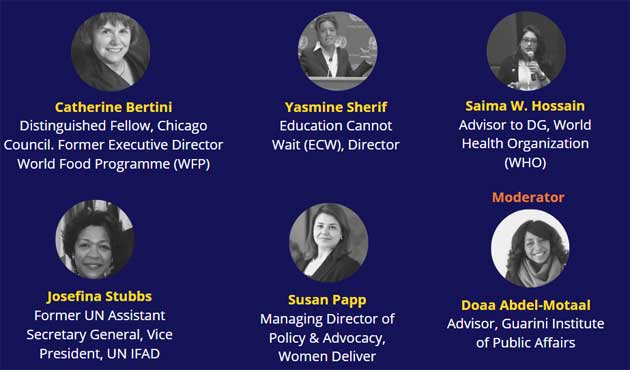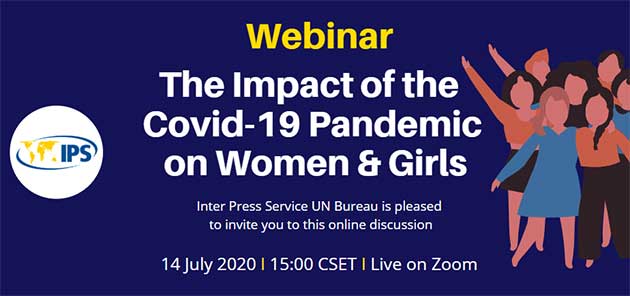What’s needed to ensure that policymakers and decision makers put women and young girls first?
The world is counting the cost of COVID-19. It has affected everyone, everywhere and it threatens to undo the gains in recent years for women and young girls. It is estimated that nearly 60% of women around the world work in the informal economy, earning less, saving less, and at higher risk of falling into poverty. Many of the elderly are women, a population vulnerable to the ravages of the pandemic. Many young girls have been forced out of school – and may not return. With its massive months-long lockdowns, the crisis has created vulnerabilities for women to domestic, sexual violence and gender-based violence.
Program and Speakers
July 14, 2020, at 3 pm CSET

The all-women panel of international thought leaders will discuss and make recommendations for consideration by all sectors of society, from governments to international organizations and to civil society organizations, in order to respond to the needs of women and girls during and after this public health crisis, with examples of actions already taken and what more needs to be done.
We invite you to connect via Zoom to this Webinair by using one of the following instructions.
With a computer (Desktop/laptop PC), you should:
1) Download software (Zoom Client for Meetings) from https://zoom.us/download webpage.
2) Test your audio/video by using the Zoom Test Meeting Room e.g. https://zoom.us/test
3) Registration link: https://bit.ly/31DcDZt
4) Zoom event link: https://us04web.zoom.us/j/77713771746
With a mobile device (tablet/smart phone), you should:
1) Download Mobile App (Zoom Cloud Meetings) from Apple Store or Google Play Store.
2) Test your audio/video by using the Zoom Test Meeting Room e.g. https://zoom.us/test
3) Registration link: https://bit.ly/31DcDZt
4) Zoom event link: https://us04web.zoom.us/j/77713771746
Catherine Bertini
Catherine Bertini is a distinguished fellow of global food and agriculture at the Chicago Council on Global Affairs.
For ten years, she was executive director of the United Nations World Food Program, the world’s largest international humanitarian agency. She was the third woman and first American woman to lead a UN agency. Shebecame the 2003 World Food Prize laureate for her groundbreaking leadership at WFP. Bertini was UN Under Secretary General for Management and the UN Security Coordinator. She led the US domestic nutrition programs as USDA assistant secretary for food and consumer services and the nation’s assistance program for single mothers at the US Department of Human Services. She chaired the UN System Standing Committee on Nutrition (UNSCN).She was appointed to the Board of International Food and Agricultural Development (BIFAD) by Presidents Bush and Obama.
Bertini was senior fellow on the first agriculture team at the Bill and Melinda Gates Foundation and served as a fellow at the Rockefeller Foundation. She is chair of the board of the Global Alliance for Improved Nutrition (GAIN) and a board member of the Global Food Banking Network (GFBN). WFP/USA hosts the Catherine Bertini Trust Fund for Girls Education.
Bertini is a professor emeritus at the Maxwell School of Citizenship and Public Affairs at Syracuse University. She had fellowships at the Ford School of the University of Michigan and the Kennedy School at Harvard University. She is on the advisory board and a fellow of the Scowcroft Institute at the Bush School at Texas A&M University. Other affiliations include: affiliated expert at the Lugar Institute: senior advisor at the Center for Strategic and International Studies (CSIS); board member of the Stuart Family Foundation.
—–
Yasmine Sherif
Yasmine Sherif is the Director of Education Cannot Wait (ECW) – a global fund for education in emergencies and protracted crisis established by the World Humanitarian Summit. A lawyer specialized in International Humanitarian Law and Human Rights Law (LL.M), she has 30 years of experience with the United Nations (UNHCR, UNDP, OCHA) and international NGOs, starting her international career in 1988.
Sherif has served in some of the most crisis affected countries and regions on the globe, including Afghanistan, Bosnia & Herzegovina, Montenegro, Cambodia, the Democratic Republic of the Congo, Sudan, and across the Middle East, including Jordan (the Syria-crisis) and the occupied Palestinian territory, as well as in New York and Geneva. Her expertise spans
Sherif has also worked as an Adjunct Professor responsible for the Masters Programme on the United Nations, humanitarian assistance, and human rights at Long Island University (LIU), and has published on international humanitarian and development issues, as well as international law. She is the author of the book, The Case for Humanity: An Extraordinary Session, which was launched at the United Nations in New York in 2015, and a Champion for ‘No Lost Generation.’In 2017, she received the annual award “Sweden’s UN Friend of the Year.”
—–
Saima W. Hossain
Saima Wazed Hossain is Advisor to the Director-General, World Health Organization (WHO), on Mental Health and Autism. She is Chairperson, National Advisory Committee for Autism and NDDs, Bangladesh; Chairperson, Shuchona Foundation; International Focal Point, Advocacy Group on Disability Inclusive Disaster Risk Management (DiDRM), Bangladesh. A licensed School Psychologist, nationally certified in the United States, she is a specialist in Clinical Psychology. A graduate from Barry University in Florida, she is an expert on Neurodevelopment disorders and mental health, and an accomplished speaker whose efforts has led to international awareness, policy and program changes, and the adoption of three international resolutions at the United Nations and WHO. Even though she is not a parent of a child with autism, she has been engaged in this field professionally, encouraging others, whether with direct connection to NDDs or not, to be supportive of her work. Her other interests are multi-modal therapy and crisis intervention counselling, and development of multi-disciplinary/multi-stakeholder partnerships, among others.
Wazed Hossain is a member of WHO’s Expert Advisory Panel on Mental Health. She is Chairperson of the Bangladesh National Advisory Committee for Autism and Neurodevelopment Disorders and Chief Advisor for National Mental Health Strategic Plan Working Group. As the focal person for disability for the Ministry of Disaster Management and Relief, Government of Bangladesh, she is working to ensure that mental health and issues related to persons with disabilities are incorporated into the international guidelines developed by UNISDR. She was WHO’s Goodwill Ambassador for Autism in the South East Asia Region prior to which she was WHO’s regional Champion for Autism in South Asia. Wazed Hossain has been educated in Bangladesh, India, and the United States. Currently she is pursuing her doctoral degree from Barry University and is also the Chairperson of her own NGO – Shuchona Foundation – a not-for-profit advocacy, research and capacity-building organization based in Dhaka. She is the daughter of the Prime Minister of Bangladesh, Sheikh Hasina and the mother of three daughters and one son.
—–
Josefina Stubbs
Josefina Stubbs is currently Senior Manager multilateral relations in Enel Green Power, Italy and former Assistant Secretary General and Vice President Strategy and Knowledge in UN IFAD. Previous to IFAD Stubbs worked as Sector Leader of Social, Environment and Rural development in the World Bank. With over 20 years of experience in the field of development and management, Stubbs has a strong track record of working on social inclusion and supporting women’s empowerment and gender equality.
—–
Susan Papp
Susan Papp serves as the Managing Director of Policy and Advocacy at Women Deliver. She is an award-winning advocate and policy expert with a passion for improving the health and wellbeing of vulnerable populations. She has 20 years of experience working on global projects to advance political will, policies, and funding for a variety of issues relating to girls’ and women’s health and women’s economic empowerment. Before joining Women Deliver, she served as a Vice President at Rabin Martin where she supported the advocacy efforts for MSD for Mothers and Saving Mothers Giving Life. Papp also worked with the White Ribbon Alliance for Safe Motherhood in India and evaluated social accountability programs to improve maternal health outcomes in Orissa. Earlier, she served as a Vice President at GMMB, where she directed advocacy and communications campaigns for several UN agencies, private sector companies, and the Bill & Melinda Gates Foundation. Susan began her career on Capitol Hill where she worked for two US Senators. She holds an MSc in Health, Community, and Development from The London School of Economics and Political Science.
—–
Doaa Abdel-Motaal
Doaa Abdel-Motaal is Advisor at the Guarini Institute of Public Affairs in Rome, Italy. She is the former Executive Director of the Rockefeller Foundation Economic Council on Planetary Health, the former Chief of Staff of the United Nations International Fund for Agricultural Development (IFAD), and former Deputy Chief of Staff of the World Trade Organization (WTO).
She is also a writer. Her latest book Antarctica, the Battle for the Seventh Continent, was released in September 2016 and has been nominated for the 2018 Mountbatten Best Book Award.
She holds a Masters and Doctoral degree in environment and development studies from the University of Cambridge and the University of Geneva.
Original Post: http://www.ipsnews.net/impact-covid19-pandemic-women-girls/

